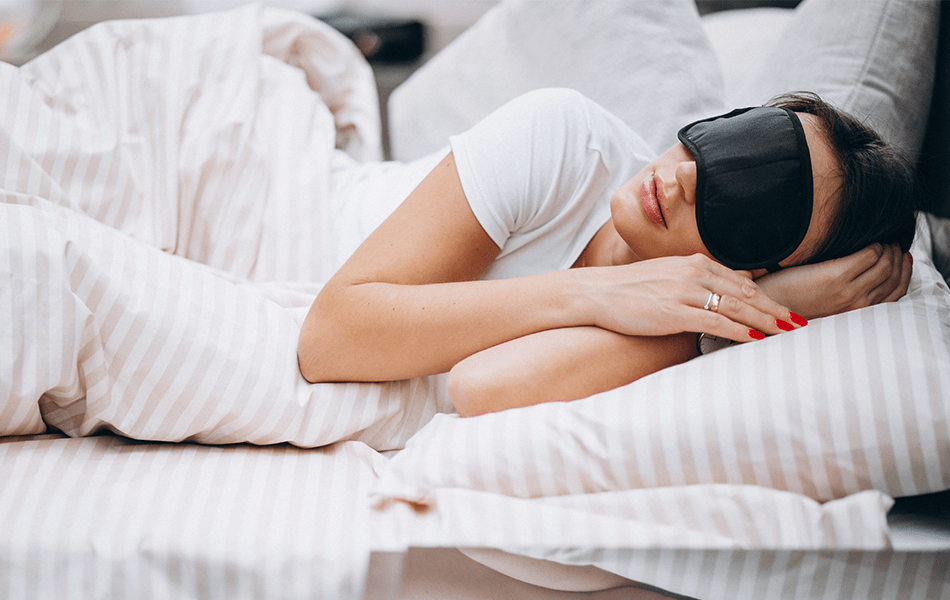In case that you have difficulty falling asleep at night, establishing a bedtime routine can give a structure for appropriate rest for people who have sleep problems. A list of activities that are carried out in the same peace, every evening, in the period of time ranging from thirty to sixty minutes before to going to bed is referred to as a bedtime routine.
The activities that make up a person’s bedtime routine can differ from person to person, but they typically consist of things that are peaceful, such as taking a warm bath, reading, keeping a journal, or meditating. The incorporation of a pre-sleep ritual into one’s lifestyle is a straightforward approach to making the most of one’s time in the hours leading up to sleep.
Keep reading to learn more about meditation and how it can help you improved sleep more quickly, as well as the steps you can take to improve the sleep quality through meditation, and to learn about the benefits of sleep meditation.
What is Meditation for Sleep?
We learn, through the practice of meditation, to spend less time in our heads and more time paying attention to the here and now. The propensity of the mind to become preoccupied with thoughts is probably at its height right before we go to sleep, when we all of a sudden cease moving and become still.
Meditation for sleep is an unique, guided experience that delivers a natural sleep aid all on its own. It allows us to let go of the day, including all that has happened and everything that has been said, so that we can rest the mind while also resting the body.
Why Are Bedtime Routines Important?
A healthy bedtime routine can help people of any age, but the necessity of establishing one during childhood is very clear. However, children are not the only age group that can benefit from having a regular night routine. A consistent bedtime ritual has been demonstrated to relieve irritable infants and their caretakers, helping children fall asleep more quickly and waking them up less frequently throughout the night. This pattern should be followed every night. But the rituals that grownups follow before going to bed are just as vital. Your brain is better able to differentiate between the day and night with the meditation helps which also serve to relieve stress and prepare you for a restful sleep.
What Is a Good Bedtime Routine For Adults?
Your nighttime schedule can be altered to accommodate your individual requirements and the conditions in which you sleep. You can prepare your body and mind for a pleasant night’s sleep by adopting some simple sleep hygiene principles into your regular routine.
Here are 11 night rituals to help you sleep better:
Let’s take a look at certain meditation routines that tend to be effective for sleep, as well as how to carry out each of these techniques.
1. Set a time to go to bed.
As part of the normal cycle of your body’s sleep and waking cycles, a few hours before bedtime, your brain starts to wind down in preparation for sleep hygiene. You can make the most of the time between being awake and falling asleep by utilizing the routine you follow right before bed. Make a plan for what time you want to go to sleep and what time you want to wake up that works best with your schedule, and commit to following that plan every day, even on the weekends. Maintaining a regular bedtime routine helps educate your brain to feel naturally sleepy at the time that it should be ready for bed.
Next, create a routine that you will follow every night to get ready for bed. This routine should start anywhere from half an hour to two hours before bedtime. If it’s necessary, set an alarm to remind you.
2. Set up your room.
As part of your nightly ritual, you might make an effort to create your bedroom into a sleep haven by ensuring that it is as quiet place, dark, and comfortable as is humanly feasible. Adjust the temperature on the thermostat to a range that falls between 65 and 68 degrees Fahrenheit. Turn off any electronics that make a lot of noise. Turn down the lights, and draw the blackout drapes over the window. Put things where they belong and clear the clutter. Utilize an aromatherapy diffuser to take pleasure in the aroma of your choice.
Getting into bed should be the very last thing you do before turning in for the night. Make sure that this is the very last thing that you do, and as soon as your head touches the pillow, do not engage in any activity other than attempting to fall asleep. Your bedroom should be a calming space that is reserved exclusively for restful sleep and feel relaxed.
3. Get in a warm tub.
Your metabolism goes through a variety of shifts at different points throughout the day as a natural consequence of the sleep-wake cycle. A decrease in your core body temperature is one of these, as is the creation of melatonin, which starts in the evening to get you ready for sleep and continues until you doze off.
Researchers have discovered that taking a hot bath in the evening can provide the same sleepy effect as letting one’s body temperature drop naturally during the night. Think about soaking in a soothing hot bath for about an hour before you hit the hay. Because the water causes your body to heat up, and then swiftly cool down again as it evaporates, you will experience a sensation that is similar to being fatigued but yet being calm.
4. Wear comfortable clothes.
It is important for us to wear comfy clothes that enable us to unwind our entire bodies. It is also possible to do it while wearing comfy clothes that you already have at home.
As long as our clothes allows us to be comfy in any position we assume when meditating, it doesn’t matter if our pants have a baggy style or even if we’re wearing sweatpants. Nothing, not even anything as simple as clothing, should cause our concentration to waver while we are practicing meditation.
5. Put away the gadgets.
Electronic devices, such as laptops, televisions, cellphones, and tablets, all emit a strong blue light. While watching television or scrolling through social media may feel peaceful in the moment, this light can have negative effects on your eyes over time. When you use these devices, your brain is bombarded with blue light, leading it to believe that it is the middle of the day. As a direct consequence of this, your brain will actively seek to prevent the creation of melatonin and will do its best to keep you awake.
Put away any electronic devices just when you start winding down for the night. Electronic devices should be used as little as possible in the evening if at all possible. Be sure to activate the red-light filter on your phone well in advance of starting your daily routine. That way, if you do happen to peek at your phone in the middle of the night, it will not be as distracting.
6. Have a small snack or some tea before bed.
Indigestion, acid reflux, and trips to the bathroom in the middle of the night are all sleep-disrupting side effects of eating heavy meals and drinking alcoholic beverages before going to bed. However, going to bed without having eaten might also cause stomach problems.
Find a healthy balance by settling your stomach with a light snack, such a piece of fruit or some yogurt. This will help you find a healthy middle ground. It has been found that eating foods like cherries, grapes, kiwis, rice, and nuts can help people fall asleep faster . Herbal teas that do not include caffeine, particularly those that contain chamomile or lavender, are an additional pleasant way to induce sleep and soothe the mind wanders.
7. Read a Good Book.
Reading in the evening is a normal practice that most people start when they are children and can continue to promote healthy sleep even into adulthood. When you are an adult and want to make reading part of your bedtime ritual, steer clear of thrilling genres like suspense and action. Sometimes the finest novel is one with a plot that is straightforward or uninteresting.
8. Make a list of things to do or a journal.
Writing in a journal may be soothing for many people, and doing so in the evening before going to bed can help sort through thoughts and feelings.
Consider beginning with a straightforward to-do list if the thought of keeping a journal is too daunting for you. According to the findings of one study, individuals who spent five minutes right before going to bed writing down a brief to-do list of activities that needed to be completed in the following days better sleep substantially more quickly.
9. Try out meditation.
Similar to practicing yoga, regular meditation practice can help enhance the quality of sleep you get. Instead of being anxious about not being able to fall asleep, practicing mindfulness meditation teaches people how to accept their thoughts and better manage their emotions, which makes it easier to fall asleep.
To engage in the practice of mindfulness meditation, all you need to do is close your eyes and give yourself permission to concentrate on your internal experiences, both conscious and subconscious. Simply observe your ideas without passing judgment on them. Other forms of meditation include focusing on one’s breath and visualizing positive outcomes. On the internet, one may get a lot of different guided meditation routine activities for free.
10. Stretch, breathe, and take it easy.
By directing your attention to your body and practicing mindfulness meditation, relaxation techniques like breathe deeply and breathe slowly exercises and progressive muscle relaxation (also known as PMR) can assist in the release of both physical activity and mental state. It has been demonstrated that doing yoga on a daily basis can improve the quality of better sleep, and that a few light stretching or a massage before bed can prevent cramps.
11. Listen to Music.
The right song at the right time can be a potent stress reliever. It does not matter what genre the music is as long as it is able to settle you down. Turn on some music, close your eyes, and allow yourself to be distracted from your worries and anxious thoughts by the music.
Other kinds of sound, such as background noise, white noise, or even pink noise, may also help one fall or stay asleep. It has been demonstrated that listening to pink noise, such as rain or waves, can increase the quality sleep, and listening to white noise can help you fall asleep more quickly by obscuring other sounds. A variety of streaming services provide users with customized playlists of white noise and pink noise to listen to.
Meditating before Bed: How doe it help you get a better night routine?
Let’s look at what can happen when you learn how to meditate before bed and why it’s a good idea.
1. More peaceful sleep.
Meditation is a discipline that helps us still the chatter in our heads and put an end to the commotion that is caused by our thoughts. It brings about a feeling of calm, which in turn makes it easier to go asleep and stay asleep. We are able to calm the mental turbulence by focusing on our deep breathing and increasing the length of our exhalations. Insomnia, night terrors, and panic attacks brought on by waking up in the middle of the night will all become less common as a result of our efforts.
Getting a good sleep requires giving ourselves permission to relax so that we may face the day with restored vitality and power.
2. Start your day with energy and a good mood.
Through meditation, we are able to engage parts of the brain that are associated with rewards, and as a result, we experience more positive responses. This chemical shift that takes place at the level of the brain causes us to wake up in a better mood and to view things from a significantly more optimistic perspective, which adds a good quality sleep to the value of the experiences we have. These feel-good hormones, such as dopamine, serotonin, and endorphins, are stimulated as a result of the relaxation response and calmness that is generated via the practice of meditation. It should therefore not come as a surprise that when we first wake up, our outlook on life tends to be more hopeful.
3. Finding our place of peace helps us focus.
We take everything that has come up throughout the day with us to bed to think about everything that we have to do while concentrating on the future, as we have stated previously. When we meditate at this moment, we are able to notice everything that causes us concern and view it with less worry, putting us in a better position to find a solution to it when the time is right. When we are able to bring our thoughts under control, we enter a level of tranquility that enables us to have a greater command over our feelings and a heightened awareness of what they are doing to us. This is an important step toward beginning the process of sleeping with a gratifying sensation of profound well-being.
In conclusion, developing the ability to meditate before going to bed has a number of advantages that help us adopt the mindset that is necessary before retiring for the night. A condition of serenity, a sense of well-being, and a dedication to our recuperation and rest are all necessary. Because the sleep quality affects us in every facet of our lives, it is imperative that we prioritize getting enough of it.
4. Enhances concentration.
When we go to bed, we bring the challenges and concerns of the entire day with us. This causes thoughts that prevent us from being able to relax and enjoy ourselves. Because of this, it is impossible to involves focusing on getting some more restful sleep, which is exactly what we require at that very moment. Before going to bed, we can improve our ability to concentrate on the tasks that lie ahead of us the next day by engaging in a session of meditation. We give ourselves a rest so that we may continue with the day the following day. This allows us to concentrate our attention on the tasks that are still outstanding without the added stress that our minds normally produce.
Written by Hlyn Fernandez





